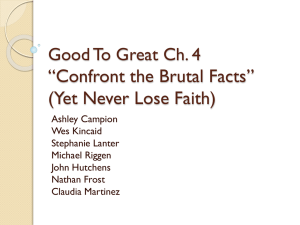Confront the Brutal Facts (Yet Never Lose Faith)
advertisement
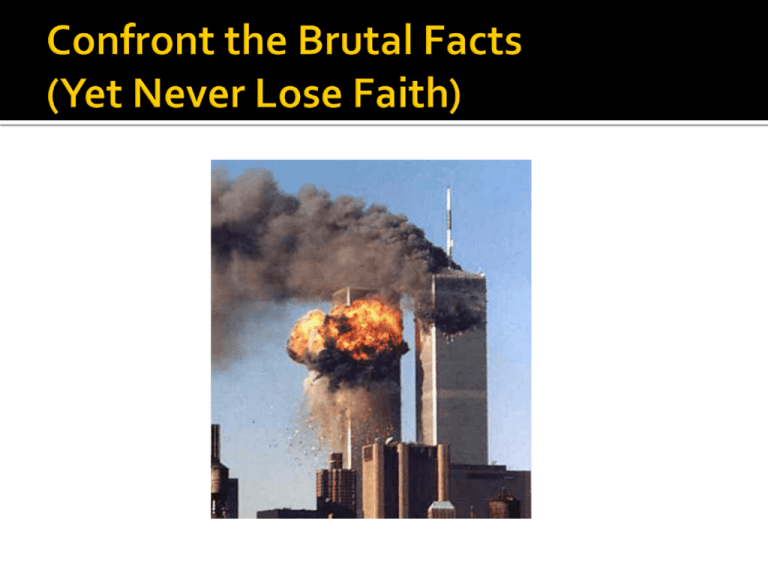
• The Great Atlantic & Pacific Tea Company and Kroger were both old companies heading into the 1970s •After society recovered from the World Wars and the Great Depression, the grocery store industry started to change. •Kroger faced the facts of the changing industry and launched a campaign to revamp its business model to create value for its customers •A&P ignored these brutal facts Notes: 1.Kroger transition point occurred in 1973. 2.Chart shows value of $1 invested on January 1, 1959. 3.Cumulative returns, dividends reinvested, to January 1, 1973 http://74.125.113.132/search?q=cache:sH3_IQilpEIJ:kimboal.ba.ttu.edu/MGT%25204380%2520SP%2520 09/094/Raynee%2520Bradley.ppt+good+to+great+kroger+A%26p&cd=3&hl=en&ct=clnk&gl=us Kroger, A&P, and the market Cumulative value of $1 invested 1973-1998 Notes: 1.Kroger transition point occurred in 1973. 2.Chart shows value of $1 invested on January 1, 1973. 3.Cumulative returns, dividends reinvested, to January 1, 1998 http://74.125.113.132/search?q=cache:sH3_IQilpEIJ:kimboal.ba.ttu.edu/MGT%25204380%2520SP%25200 9/094/Raynee%2520Bradley.ppt+good+to+great+kroger+A%26p&cd=3&hl=en&ct=clnk&gl=us Adressograph • “When you turn over rocks and look at all the squiggly things underneath, you can either put the rock down, or you can say, ‘My job is to turn over rocks and look at the squiggly things,’ even if what you see can scare the hell out of you. •Addressograph fell victim to strong leadership. •“I…had no need for cheering dreams. Facts are better than dreams.” -Winston Churchill The Shipping Industry and Total Security Management Terrorism, political upheaval, natural disasters, accidents and other large scale disruptive events are happening more frequently, and they are having a more significant impact than in previous years. 9/11 made evident the fact that the shipping industry is extremely delicate, and that a disruption can be measure in the trillions of dollars. Transportation security initiatives that focus on security in the context of a firm’s specific business imperatives have the most potential to create a real return on security investment. A firm’s reputation for delivering services and performing under difficult circumstances is intimately tied to its perceived brand equity Supply chain visibility is a powerful tool or businesses to keep customers fully informed of the status and condition of their shipment The ability to identify movement in the value chain. The ability to identify this movement can represent a measure of success and differentiation from one’s competitors where business processes are concerned. FedEx famously revolutionized package delivery by providing clients the ability to know precisely where packages were and if they’d been delivered. Motivating people Finding motivated people to begin with It’s about not demotivating motivated people. Stop kidding yourselves Visionary style vs. truth style. Leading with truth Using questions, not answers Dialogue and debate Autopsies without blame Red Flag mechanisms Circuit City CEO Alan Wurtzel The prosecutor Avoiding group think Group think is always bad “Yes-men” Nucor Absolutely horrible Began by seeking questions ▪ Furious debates Socratic method ▪ B. Law with Kelly Clark ▪ Dialogue rather than monologue Analyzing failures without placing blame. Philip Morris Acquired Seven-Up Company. Complete fiasco. EBay Acquired Skype. Working to spin it off. Developing a set of controls and measures Stanford Business School Know what is wrong quickly Lockheed Martin Their Earned Value Management System EVM ▪ Allows for an early warning of poor performance ▪ Keeps project members focused Six Sigma Quality Control Scott Paper Procter & Gamble • Was the leader in the paper-based consumer business until late 1960s • Enters the paper-based consumer business in the late 1960s Procter & Gamble Scott Paper • Procter & Gamble takes over and becomes the leader in the market • Scott Paper resigns to staying second in the market and gives up without a fight • Tries to protect what it has Kimberly-Clark “I want everyone to rise in a moment of silence. That was a moment of a silence for P&G.” Viewed competing against P&G as an asset, an opportunity to make them better and stronger Kimberly Clark • Good to great companies leave themselves stronger and more resilient • “We will never give up. We will never capitulate. It might take a long time, but we will find a way to prevail.” P&G Scott Paper • Companies that decide not to be good to great leave themselves weaker and more dispirited • Scott Paper was eventually taken over by Kimberly Clark Robert Aders of Kroger “There was a certain Churchillian character to what we doing. We had a very strong will to live, the that we are Kroger, Kroger was here before and will be here long after we are gone, and, by god, we are going to win this thing. It might take us a hundred years, but we will persist for a hundred years, if that’s what it takes.” Compared to A&P talked about earlier International Committee for the Study of Victimization (looked at people who had suffered serious adversity-cancer patients, P.O.W’s, accident victims) People fell into three categories: 1. Those permanently dispirited by event 2. Those who got their life back to normal 3. Those who used the experience as a defining event that made them stronger (good-to-great companies were like this group, with the “hardiness factor”) David Maxwell and Fannie Mae; Began transition in early 80s Had $56 billion in loans Never had the goal to merely survive but to prevail as a great company Never entertained the possibility that they would fail Six Million Dollar Man-didn’t use the fact that Fannie Mae was bleeding and near death as a pretext to restructure the company, but used it as opportunity to create something much more stronger and powerful, rebuilt the entire business model around risk management Eventually generated stock returns nearly eight times the market over fifteen years Admiral Jim Stockdale Every good-to-great company faces significant adversity along the way to greatness. Gillette and hostile takeover battles. Accept reality but commit to prevail. “I never lost faith in the end of the story.” –Stockdale The Optimists Circuit City Those operating on both sides of the Stockdale Paradox. Retain faith Confront Reality Why Kroger and Pitney Bowes succeeded. Winston Churchill and strong leadership. Total Security management. ▪ Creating Value with visibility. Group think and the Circuit City example. Good to great companies remain strong and resilient. Stockdale Paradox. Retain faith but stay concise to the reality.
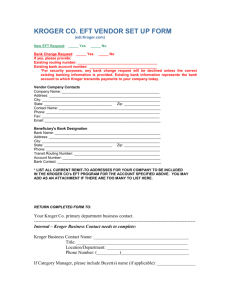

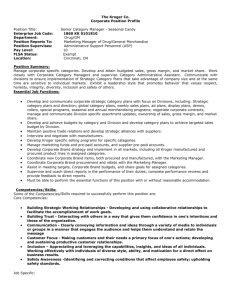
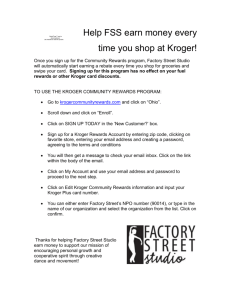
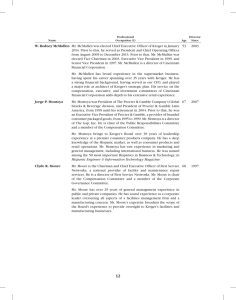
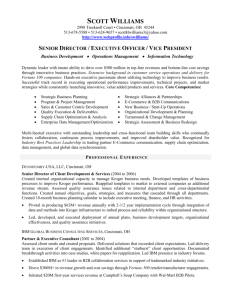
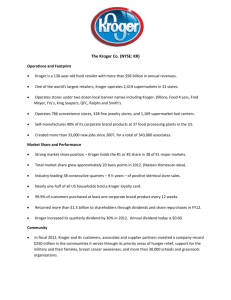
![Confront The Brutal Facts [Yet Never Lose Faith] Chapter 4 Team 6](http://s2.studylib.net/store/data/009988186_1-61176f1d10ff73815a2241b408882d9f-300x300.png)
